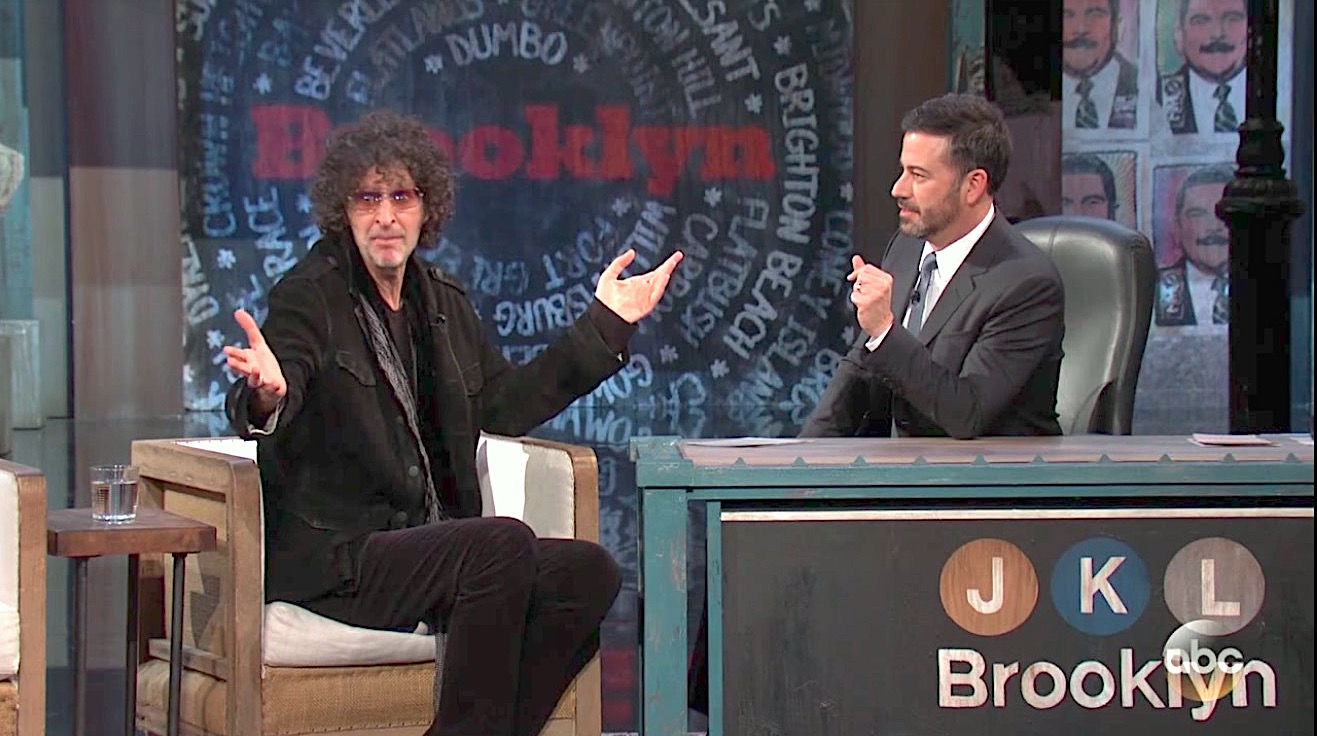Howard Stern explains his problems with Harvey Weinstein on Jimmy Kimmel Live


A free daily email with the biggest news stories of the day – and the best features from TheWeek.com
You are now subscribed
Your newsletter sign-up was successful
If you last tuned in to Howard Stern during his '90s "shock jock" days, the Stern who sat down with Jimmy Kimmel in Brooklyn on Wednesday might come as a surprise. "The most boring broadcasters are the ones that don't evolve, they don't change ... they don't grow up," he said. Back in his 20s and 30s, on AM/FM radio, "sex, and sex talk, and outrageousness was the thing, because you were breaking all the boundaries — it was taboo." Once he moved to satellite radio, "where you can do anything," Stern said, doing that kind of a show "would actually be, I think, a bit of a bore."
Stern showcased his quasi-maturity when he brought up disgraced Hollywood producer Harvey Weinstein. "This guy, it's an unbelievable story, and I said all these guys who do sexual harassment — I mean, they're freaks," he said. "This big fat guy, what does he think? He says to a woman — here's his standard move, according to all these women who've accused him — he goes, 'Listen, I'm going to get in the shower, I want you to watch me nude.' Now, I'm a man — if you saw me naked, you'd throw up. There's no girl on the planet that wants to see Harvey Weinstein naked and is gonna get aroused."
"Same with this Bill O'Reilly," the former Fox News host, Stern said. "What is it with these guys and the shower? Men don't look good in the shower." And convicted sexter Anthony Weiner, too. "The one thing women don't want to see is a guy's penis," Stern said. "They want to see you've got a job, they want to see you treat them nice." There is some mildly NSFW language, at least by the standards of '90s terrestrial radio. Watch below. Peter Weber
The Week
Escape your echo chamber. Get the facts behind the news, plus analysis from multiple perspectives.

Sign up for The Week's Free Newsletters
From our morning news briefing to a weekly Good News Newsletter, get the best of The Week delivered directly to your inbox.
From our morning news briefing to a weekly Good News Newsletter, get the best of The Week delivered directly to your inbox.

A free daily email with the biggest news stories of the day – and the best features from TheWeek.com
Peter has worked as a news and culture writer and editor at The Week since the site's launch in 2008. He covers politics, world affairs, religion and cultural currents. His journalism career began as a copy editor at a financial newswire and has included editorial positions at The New York Times Magazine, Facts on File, and Oregon State University.
-
 The EU’s war on fast fashion
The EU’s war on fast fashionIn the Spotlight Bloc launches investigation into Shein over sale of weapons and ‘childlike’ sex dolls, alongside efforts to tax e-commerce giants and combat textile waste
-
 How to Get to Heaven from Belfast: a ‘highly entertaining ride’
How to Get to Heaven from Belfast: a ‘highly entertaining ride’The Week Recommends Mystery-comedy from the creator of Derry Girls should be ‘your new binge-watch’
-
 The 8 best TV shows of the 1960s
The 8 best TV shows of the 1960sThe standout shows of this decade take viewers from outer space to the Wild West
-
 ‘One Battle After Another’ wins Critics Choice honors
‘One Battle After Another’ wins Critics Choice honorsSpeed Read Paul Thomas Anderson’s latest film, which stars Leonardo DiCaprio, won best picture at the 31st Critics Choice Awards
-
 Son arrested over killing of Rob and Michele Reiner
Son arrested over killing of Rob and Michele ReinerSpeed Read Nick, the 32-year-old son of Hollywood director Rob Reiner, has been booked for the murder of his parents
-
 Rob Reiner, wife dead in ‘apparent homicide’
Rob Reiner, wife dead in ‘apparent homicide’speed read The Reiners, found in their Los Angeles home, ‘had injuries consistent with being stabbed’
-
 Hungary’s Krasznahorkai wins Nobel for literature
Hungary’s Krasznahorkai wins Nobel for literatureSpeed Read László Krasznahorkai is the author of acclaimed novels like ‘The Melancholy of Resistance’ and ‘Satantango’
-
 Primatologist Jane Goodall dies at 91
Primatologist Jane Goodall dies at 91Speed Read She rose to fame following her groundbreaking field research with chimpanzees
-
 Florida erases rainbow crosswalk at Pulse nightclub
Florida erases rainbow crosswalk at Pulse nightclubSpeed Read The colorful crosswalk was outside the former LGBTQ nightclub where 49 people were killed in a 2016 shooting
-
 Trump says Smithsonian too focused on slavery's ills
Trump says Smithsonian too focused on slavery's illsSpeed Read The president would prefer the museum to highlight 'success,' 'brightness' and 'the future'
-
 Trump to host Kennedy Honors for Kiss, Stallone
Trump to host Kennedy Honors for Kiss, StalloneSpeed Read Actor Sylvester Stallone and the glam-rock band Kiss were among those named as this year's inductees
